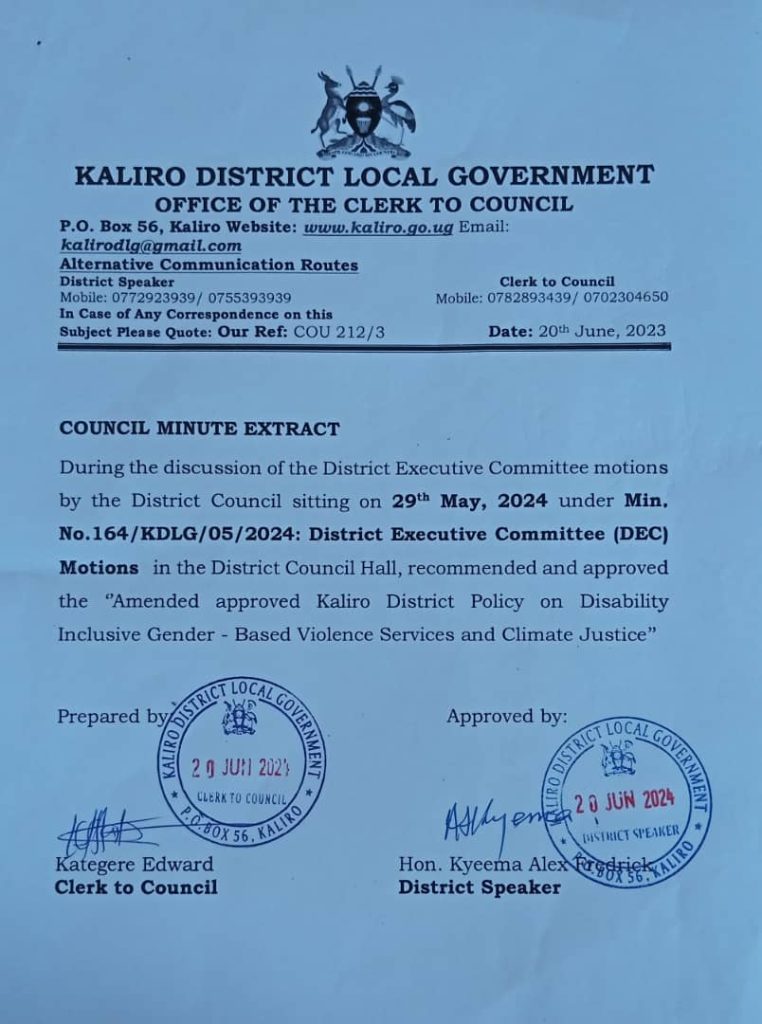By [Elizabeth Kayanga], Executive Director, Integrated Disabled Women Activities (IDIWA)
In our work at Integrated Disabled Women Activities, we are often confronted by the complex realities facing women and girls with disabilities. Climate change, gender-based violence, and disability related challenges form a unique, intersectional burden that demands tailored policies and actions. The recent amendments to the Kaliro District Policy on Disability Inclusive GBV Services and Climate Justice stand as a critical measure to address these overlapping issues head-on, aiming to safeguard and empower our most vulnerable communities while fostering resilience against climate-related risks.
Disability, climate vulnerability, and gender-based violence do not operate in isolation. Each factor exacerbates the others, creating layered risks that disproportionately impact women and girls with disabilities. In a world increasingly affected by the effects of climate change, the ability to live safely and with dignity becomes even more precarious for those who face compounded vulnerabilities.
Climate change has far-reaching impacts on resources, health, and security, and the most marginalized, including women and girls with disabilities, are often the first to feel its adverse effects. Resource scarcity, displacement, and food insecurity contribute to greater incidences of GBV, making it essential for our policies to evolve in ways that recognize and address these interconnected threats.
The amendments to the Kaliro District Policy on Disability Inclusive GBV Services and Climate Justice represent a transformative step forward. By embedding disability and climate justice considerations within the GBV framework, the policy is now more responsive to the specific needs of WGDs who face heightened risks under adverse climate conditions. The policy ensures that WGDs have prioritized access to GBV response services, shelter, and legal assistance, all critical resources that previously may have been inaccessible.
With a new emphasis on sustainable practices, the policy directs more resources toward building climate resilience among WGDs. This includes establishing community-driven initiatives focused on adaptive skills for climate challenges, such as eco-friendly farming techniques and climate-responsive economic opportunities.
The amendment process was not merely a legislative exercise; it involved collaboration with WGDs, local leaders, duty bearers, and climate advocates who contributed critical insights on the real-world implications of GBV and climate change. This inclusive approach allowed us to capture diverse perspectives, particularly from those directly affected by these crises, enabling us to draft a policy that serves our communities more effectively.
While these policy changes are encouraging, they are just the beginning. We call upon policymakers, donors, and the broader community to rally behind these reforms and to engage in ongoing advocacy for the rights of WGDs. IDIWA is committed to facilitating continuous training, community sensitization, and robust monitoring to ensure these changes translate into meaningful impact.
The amended Kaliro District Policy on Disability Inclusive GBV Services and Climate Justice is a milestone in our journey toward an equitable society that upholds the dignity, safety, and empowerment of every individual. This comprehensive approach to addressing disability, GBV, and climate justice stands as an example for other districts in Uganda and beyond, signaling a way forward where no one is left behind in the fight for social, environmental, and gender justice.

